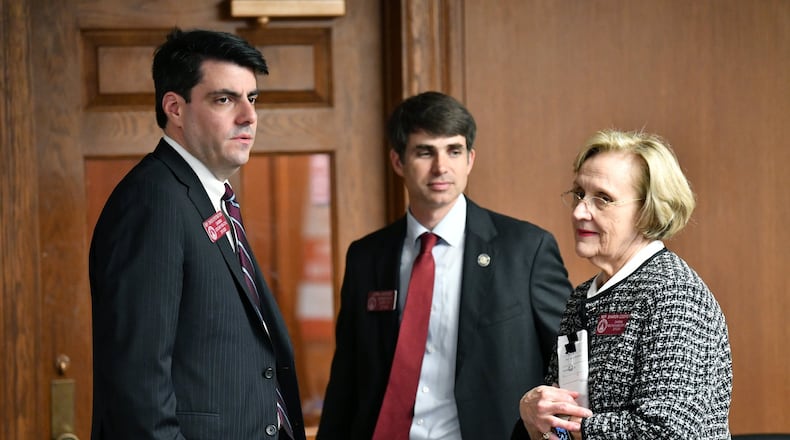A plan to offer additional scrutiny of suspicious deaths at nursing homes and assisted living facilities seemed positioned to finally get a full airing at the Georgia General Assembly this year.
Advocates for the elderly had been fighting for more than a decade to ensure local coroners and medical examiners get notified of deaths that seem to have links to neglect or abuse. The goal is to have another level of independent review on cases that can easily be overlooked.
» SEARCHABLE DATABASE: Details on every facility studied by the AJC
» MORE: The 'Unprotected' investigative series
Each time, the long-term care industry, which gives tens of thousands in campaign contributions to state lawmakers each cycle, was able to beat back the proposals. This time around, House Bill 955 was supposed to be a different story.
Prosecutors and advocates worked alongside representatives of the nursing home industry on a plan last fall and into the winter, the terms of which had largely seemed to be agreed upon by the time the bill was introduced this legislative session.
Then, on Monday, the nursing home industry testified before a House subcommittee to voice opposition. Among the industry’s bevy of concerns are that the bill’s increased misdemeanor penalties for not reporting neglect would demoralize their workforce and that specific language on untreated wounds could trigger unwarranted investigations.
» RELATED: Prosecutors not alerted to potential crimes
» BILL TRACKER: Follow the progress of House Bill 955
“As you would imagine, sometimes when the legislation finally does hit the press there are still disconnects between our interpretation of what it means and the party that drafted it,” said Russel Carlson, the vice president for governmental affairs for the Georgia Health Care Association, which represents nursing homes and assisted living facilities.
Some lawmakers also raised questions, and a Governmental Affairs subcommittee took no action on the bill, though the subcommittee may give it a second look if it meets on Wednesday.
The advocates on Monday argued that the change on reviewing questionable deaths is long overdue. The bill also would move failure to report elder abuse and neglect to the criminal code section commonly used by police and prosecutors. That change is critical, advocates said, because it would make it more likely that criminal charges would be filed against those who fail to notify authorities.
The bill comes on the heels of an investigation last fall by The Atlanta Journal-Constitution that identified significant gaps in the elder abuse and neglect reporting system in Georgia's assisted living and personal care homes. The series found that suspicious deaths and allegations of mistreatment in senior care facilities routinely go unreported to prosecutors and law enforcement. The AJC found dozens of homes had been cited over a four-year period for failing to report serious incidents to state regulators, and even in cases where regulators were notified of abuse, police often weren't told in a timely fashion.
“There’s been renewed interest in ensuring that elder abuse in the state is properly reported and that our laws conform with the needs that Georgians currently face with respect to ensuring nursing care and elder care facilities provide necessary treatment,” said Rep. Chuck Efstration, R-Dacula, the bill’s sponsor.
The Georgia Council on Aging was involved in working on the legislation. The group’s executive director, Kathy Floyd, said she worked closely with Carlson and his group, and that they suggested specific language that was incorporated directly into the bill that was introduced.
“Now they have new objections,” Floyd told the subcommittee. “As an entity (Georgia Council on Aging) that is supposed to represent Georgia’s seniors, this gets very frustrating that we can’t do more to protect our seniors.”
Another concern expressed on Monday was uncertainty with how the proposal would impact coroners and medical examiners across Georgia.
Mark Bowen, president of the Georgia Coroners Association, said most coroners support the proposal to involve them more in review of nursing home deaths. He said too often they don’t receive the call until it’s too late. He said that can leave families in the dark about what happened and leave the nursing home exposed to a cloud of suspicion where an independent review may have led to exoneration.
“A lot of times we’re not notified, and we end up getting the death certificate weeks or months later,” Bowen said. “The problem with that is the body could have been already buried or cremated…Most of the coroners are on board with this (proposal). We want to be notified and make a decision if we need to go or not.”
Other states are ahead of Georgia on the issue. Arkansas, for example, requires assisted living facilities and nursing homes to report all deaths to local coroners for review. The law came about after a coroner uncovered a series of suspicious deaths at a nursing home.
Thousands of Georgia families rely on assisted living communities and large personal care homes. To examine the quality of care they receive, Atlanta Journal-Constitution reporters spent more than a year compiling and analyzing thousands of government documents and databases and conducting dozens of interviews. The investigation of Georgia’s system revealed hundreds of cases of neglect and abuse, nearly two dozen deaths and dangerous gaps that leave vulnerable seniors unprotected. House Bill 987, sponsored by Rep. Sharon Cooper, R-Marietta, addresses many of the problems highlighted by the AJC’s reporting, including the need for increased training, fines and staffing. House Bill 955 tries to address gaps in reporting that sometimes leaves prosecutors and police in the dark about cases of suspicious deaths, neglect and abuse
Keep Reading
The Latest
Featured




